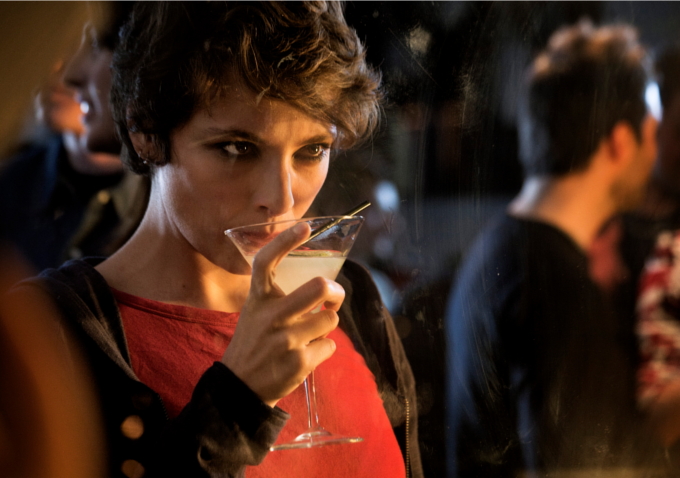 If Michael Haneke‘s “Amour” presented death as a sobering inevitability, one that will test the bounds of our ability to love, actress Valeria Golino has a slightly more nuanced perspective in her directorial debut “Miele.” While the subject of euthanasia is the entryway into the story, Golino wisely strays from turning her film into an Issues Movie, and instead opts to explore death both as a vessel for closure and a window into appreciating the life we have.
If Michael Haneke‘s “Amour” presented death as a sobering inevitability, one that will test the bounds of our ability to love, actress Valeria Golino has a slightly more nuanced perspective in her directorial debut “Miele.” While the subject of euthanasia is the entryway into the story, Golino wisely strays from turning her film into an Issues Movie, and instead opts to explore death both as a vessel for closure and a window into appreciating the life we have.
The Noomi Rapace-esque Jasmine Trinca (all cropped hair, switchblade scowl and tomboy figure) leads the film as Irene, aka the titular Miele (meaning honey), her code name when she’s on the job as an assisted suicide practitioner. But since it’s illegal in Italy, it requires almost Lisbeth Salander-ish levels of covert maneuvers. She travels to Mexico once a month and smuggles back veterinary grade barbiturates which she uses as part of her procedures, and she adheres to a rigorous set of rules to prevent detection, while maintaining a clear but distinct relationship between herself and her patients.
But her guiding principle of only helping terminal ill patients is broken one day, when she’s given the risky assignment to help Carlo (Carlo Cecchi), an elderly architect. While Miele has been present at all of her operations, leading her patients with great dignity and care during their final moments (while also giving them plenty of opportunity to change their mind), Carlo simply wants to buy the drugs and instructions on how to use them, while being left alone to decide his fate. When Irene learns after the transaction has been made that he’s actually not ill, but simply “bored” with his life, she, desperately and unsuccessfully, tries to retrieve the drugs, and winds up forming an unlikely bond with the cantankerous Carlo.
 But this isn’t a meet-cute leading, where many filmmakers could have gone, to a heartwarming story of how one young girl melts an old man’s heart. Instead, Carlo forces Irene to completely re-examine her own life, one that has left her unable to form any real connections. Her only close relationship is with Stefano (Vinicio Marchioni), a married man, whom she has lied to completely about her life, with their trysts relegated to cars and trailers, out of sight of any watchful eyes. Her only family link is with her father, with whom she shares a cordial but not especially strong tie. In many ways, Carlo becomes her only real friendship, and he’s certainly the one with whom she can be wholly honest about what she does.
But this isn’t a meet-cute leading, where many filmmakers could have gone, to a heartwarming story of how one young girl melts an old man’s heart. Instead, Carlo forces Irene to completely re-examine her own life, one that has left her unable to form any real connections. Her only close relationship is with Stefano (Vinicio Marchioni), a married man, whom she has lied to completely about her life, with their trysts relegated to cars and trailers, out of sight of any watchful eyes. Her only family link is with her father, with whom she shares a cordial but not especially strong tie. In many ways, Carlo becomes her only real friendship, and he’s certainly the one with whom she can be wholly honest about what she does.
Golino mostly directs with great care, and doesn’t shy away from what Miele does for work, nor does she judge it. Several sequences are dedicated to detailing every step of Miele’s procedure, and while Golino leaves aside any moral or ethical discussions, that’s because her focus on the emotional and psychic toll it leaves behind. Trinca’s performance is strong, as the story progreses, we subtly see how doubt begins to creep into her eyes and face. Nothing is particularly verbalized, but we eventually see Irene unable to be as clinically distant from patients, as she once was. While she never questions helping the terminally ill find a way to leave this life on their own, her concern becomes whether or not she can further bear the burden of handling that responsibility.
And yet, for all the respect with which Golino handles her film and themes, “Miele” could use a few more notes within its narrative melody. Predictable isn’t quite the right word, but the picture heads into expected places, with admirable results, but one feels it’s missing one more notch or gear to kick the material onto a slightly higher plane. And yet, some slight missteps — including the distracting use of songs by The Shins, Thom Yorke and David Byrne — can be overlooked by simply by how well Golino establishes her voice, and a careful control of pitch and tone, particularly on her first feature outing behind the camera.
Death, and the right to choose to die, will always inspire fierce debate and “Miele” doesn’t try to solve that argument. Instead, it quietly emphasizes that there can be a grace to passing away, no matter the circumstance. And for those left behind, the acceptance that we sometimes can’t control when those close to us go, is lesson that can subtly inspire one to embrace what we have in front of us. [B]





